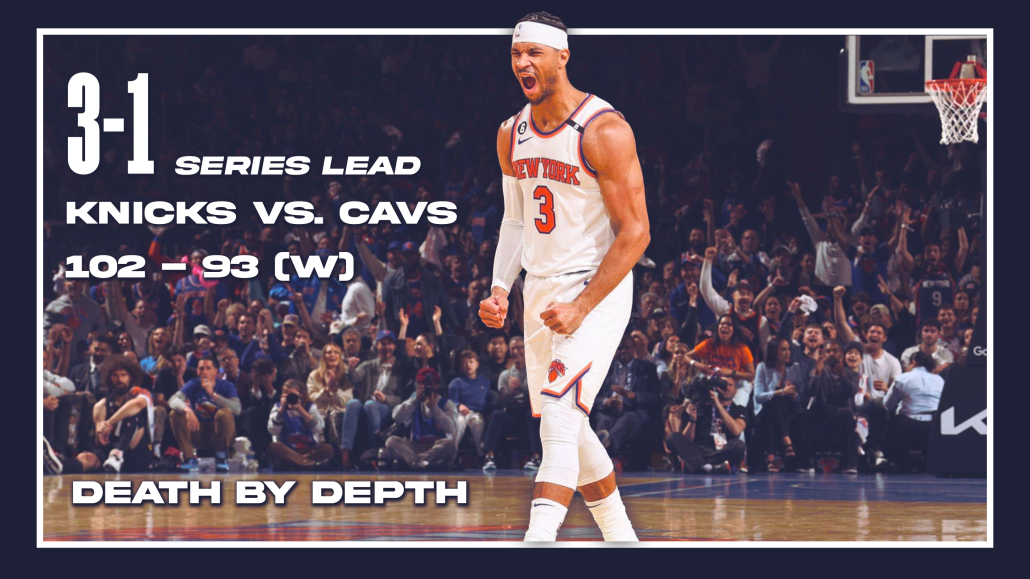Knicks 102, Cavaliers 93: Death by depth
The better team won again to take a 3-1 series lead
In the spring of 1943, World War II had taken a dramatic turn. From 1939 through the summer of 1942, the Axis powers were always winning. Germany overran Europe, bombed London every night for months on end and reached the outskirts of Moscow on the eastern front. In the Pacific, Japan didn’t lose a single battle for seven months after Pearl Harbor. Both powers reaches exceeded their grasps, and therein lay their ruin. Also when your opponent has more depth, you’re in trouble.
Japan’s top military mind, Isoroku Yamamoto, opposed war with the Americans from the very beginning. He’d lived and studied in the U.S. and understood its vast industrial capacity. Unless Japan could win a quick peace agreement, time – and production – were on the side of the enemy. As for Germany, their expansionism met its end at Stalingrad, where the Russians stunned them with a counter-offensive featuring a wealth of unknown soldiers and weaponry brought in via rail from the east. How did the Russians buy the time they needed to keep the Germans at bay long enough for reinforcements to arrive? Their depth. They sent wave after wave after wave of infantry to be mowed down by German guns, until they were ready to launch their full-scale assault.
The New York Knicks were slight underdogs entering their first-round matchup with the Cleveland Cavaliers. Not hard to see why: the Cavs have four of the top six players in the series. But whereas Cleveland is as shallow as your average mens’ rights activist, New York’s depths are as Hadean as its skyscrapers are high and the biggest reason they won Game 4 102-93, and why they’re looking more and more like the actual better team in the series. Depth kills, quietly.
With Jalen Brunson back to brilliant but Julius Randle looking lost much of the matinee, the Knicks needed someone else to step up their scoring. Two years ago, that player didn’t exist; shutting down Randle in 2021 meant shutting down the Knicks. This time around, RJ Barrett played well enough to hear the home crowd chant his name throughout the game. It wasn’t just the 26 points on efficient shooting (but that helped!). It was the tough finishes at the rim, and getting to the line 13 times, and helping create separation and pull out the win during a fourth quarter that saw Randle on the bench the whole time. Not a lot of teams have a third guy they can get that production from; almost none have one who’s only 22.
Cleveland entered the series with a deserved rep for employing one of the best big man pairings in the Association, with Jarrett Allen and Evan Mobley. And yet four games in, it’s New York’s compound monster, Mitchell Robinson and Isaiah Hartenstein, who’ve been the best bigs (and no, Mr. Marceda, it is not particularly close). Robinson collected as many rebounds as Allen and Mobley combined, while he and Obi Toppin led New York to a 17-7 edge on the offensive glass. The Knicks were up nine at the half having taken a baker’s dozen more shots than their opponent. If one side has more ammo than the other, that side will usually win.
Let’s take a moment to fully appreciate Hartenstein’s game. His final numbers – one point, eight rebounds – do not remotely reflect the positivity of his presence. He set screens that may as well have been eclipses and was a defensive presence as both a disruptor and a deterrent. Get you a big who can block fools at the rim, gather the loose ball and immediately outlet it 40 feet to a teammate who only needs two dribbles to take it the other way for two.
The German giant was an integral part of the fourth quarter lineup that won the game pulling away. Perhaps you prefer seeing him pick on someone his own size?
And of course, last and never least, ever, there’s Josh Hart, who’s only been a Knick for a couple of months but who makes it harder and harder to remember a time without him. With Quentin Grimes sidelined with a shoulder contusion, the Knicks were without their best perimeter defender and floor spacer, heading into a game where Donovan Mitchell loomed as large a threat as ever. All Hart did was outscore Mitchell 19-11, bring his usual chaos energy to the glass and transition and complete the shortest breakaway dunk I’ve ever seen.
So there you have it. Even with Grimes out and Randle out of sorts, with Immanuel Quickley going scoreless, with their bench outscored for once by the Cavs’ reserves 19-9, the Knicks were the better team for the third time in four playoff games and sixth time in eight meetings this season (their bench would like to point out they did outrebound the Cavs’ bench 19-7). The series isn’t over, by any stretch – all Cleveland has do is win at home Wednesday, then the pressure is on New York not to lose Friday and have to return to Ohio to win a Game 7 at whatever monstrosity of a name the Cavaliers call their building. Still, given all the questions the Knicks came into the series with, and their lack of postseason success together, it’s clear after four games that if they just keep doing what they’ve been doing, they’ll probably advance. Depth isn’t as sexy as star power, but when the goal is survival it may as well be Rihanna.


